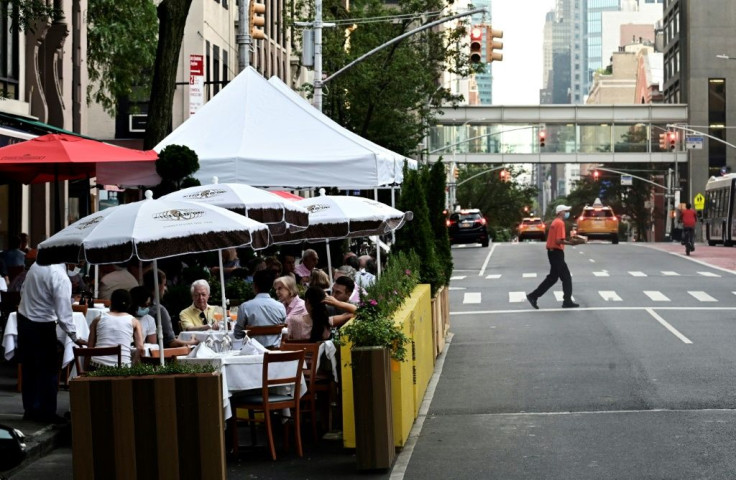Is Outdoor Dining Safe During COVID? Why Indoor Seating Might Be The Better Pick This Winter
KEY POINTS
- It’s about ventilation, an epidemiologist says
- Dining out remains risky
- Think of avoiding the novel coronavirus like trying to avoid cigarette smoke
Scientists examining the safety of dining at various outdoor environments find it may be wise to consider your options as new cases of COVID-19 surge in the United States.
"It has to do with ventilation," Anne Rimoin, a professor of epidemiology at UCLA, told ABC’s Good Morning America on Friday.
As of Thursday, Johns Hopkins University reported 153,496 new cases of COVID-19 in the United States and 919 deaths associated with the infection. By contrast, India, the country with the second-highest number of infections, reported 44,879 new positives.
The alarming rise in new cases has prompted some state authorities to limit, but not ban, indoor and outdoor dining. To the frustration of some regional chambers of commerce, indoor seating is limited to 25% capacity in many cases.
To facilitate business, some bars and restaurants have used novel means to accommodate people sitting outside, including installing tent-like structures.
Virginia Tech engineering professor Linsey Marr told Good Morning America those tents may be counter-intuitive.
"So if someone is infected and they're sitting outdoors in one of these tents, when they're breathing and talking, they're release[ing] viruses into the air and just like cigarette smoke, the air can easily flow in any direction because there's no walls," Marr said. "And once you start adding walls, you potentially block that wind. Once you add four walls, you kind of lose that benefit of being outdoors."
The U.S. Centers for Disease Control and Prevention finds on-site dining, even with reduced capacity and spaced seating, is among the riskiest ways to eat out. The safest option is to order take-out, use the drive-through or get food delivered.
Advisories issued by the CDC in March emphasized “hand washing and employees wearing a cloth face covering, as feasible” and to “intensify cleaning, sanitization, disinfection, and ventilation.” Businesses at the time were called on to encourage social distancing and adequate spacing, encouraging diners, as it does now, to order take out rather than dine in.
As recently as September, the CDC was warning that people were “twice as likely” to contract COVID-19 if they ate out compared to those who didn’t.
Commenting after Pfizer and German biotechnology company BioNTech announced a breakthrough on the pursuit of a vaccine, Dr. Anthony Fauci, the nation’s leading infectious disease expert, said this is not the time to relax.
“The cavalry is coming but don’t put your weapons down, you better keep fighting because they are not here yet,” he said.
U.S. President Donald Trump has downplayed the severity of the crisis, even after contracting COVID-19 in early October. Trump and fellow Republicans have consistently avoided tight restrictions, saying they inhibited economic growth.
On Friday, Dr. Vivek Murthy, a former surgeon general now advising President-elect Joe Biden on the pandemic, told Good Morning America the next administration would take a nuanced approach to lockdowns.
“We’re not in a place where we’re saying shut the whole country down,” he said.

© Copyright IBTimes 2024. All rights reserved.




















